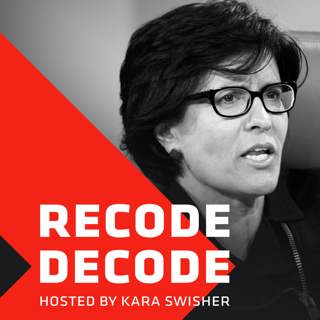
Recode Decode: Nell Scovell, author, 'Just the Funny Parts'
Writer and comedian Nell Scovell talks with Recode's Kara Swisher about her new book, "Just the Funny Parts," in front of a live audience in San Francisco. Scovell, who has written on TV shows like "The Simpsons," "Murphy Brown" and "Coach," also co-wrote the hit book "Lean In" with Facebook COO Sheryl Sandberg and tried to adapt it into a movie. She says producers tried to rework the story to fit what they considered to be successful films about women, like "Pretty Woman" and "Bridesmaids." Scovell also offers her theory for why the MeToo movement arose when it did — after Donald Trump was elected president, women had nothing left to lose — and talks about the experience of writing jokes for Barack Obama, Hillary Clinton and Mark Zuckerberg. Learn more about your ad choices. Visit podcastchoices.com/adchoices
7 Maj 20181h 7min

Recode Decode: José Andrés on feeding Puerto Rico and the 'power of food' (Live)
Celebrity chef José Andrés talks with Recode's Kara Swisher in front of a live audience at South By Southwest in Austin, Texas. Andrés explains how his food NGO, World Central Kitchen, deployed its chefs to disaster-struck areas like Houston and Puerto Rico after last year's hurricanes, opening dozens of kitchens and serving millions of meals. He criticizes President Trump and the members of Congress who neglected Puerto Rico, but praises one of World Central Kitchen's unlikely allies in distributing food after Hurricane Maria: U.S. Immigration and Customs Enforcement, a.k.a. ICE. Andrés also talks about the failings of elected officials from both sides of the aisle to achieve immigration reform, the hypocrisy of people who believe food should only be "local and organic" and why he expects to one day be replaced by a robot chef. Plus: Why he loves artificial proteins like Impossible Foods' plant-based "beef" but hates the idea of "tofurky." Learn more about your ad choices. Visit podcastchoices.com/adchoices
5 Maj 20181h

Recode Decode: Ronan Farrow
Investigative journalist Ronan Farrow talks with Recode’s Kara Swisher about his new book, “War on Peace: The End of Diplomacy and the Decline of American Influence.” The book explores how the Trump administration is “laying waste to the State Department,” but argues that it’s not the first administration to do so — cutting diplomats is politically safer than cutting military spending, and Trump is just doing it at an “unprecedented new extreme.” Farrow also talks about his reporting on Harvey Weinstein, and the culture of silence around powerful perpetrators of sexual abuse, for which he shared in a Pulitzer Prize for Public Service. Intent on keeping the spotlight on survivors rather than predators, Farrow nevertheless hints that there is more to tell about why he published his stories at The New Yorker, rather than his former employer NBC, where he started the Weinstein reporting. Learn more about your ad choices. Visit podcastchoices.com/adchoices
2 Maj 20181h 13min

Recode Decode: Sally Kohn
CNN political commentator Sally Kohn talks with Recode's Kara Swisher about her new book, "The Opposite of Hate: A Field Guide to Repairing Our Humanity." Kohn's publicity tour for the book has been tangled up in allegations that she misquoted and misrepresented two of her sources, Ijeoma Oluo and Aminatou Sow, and she discusses how she's working to make things right. She also talks about how she became a TV commentator, why she chooses to engage with Fox News hosts like Sean Hannity and how her past life working as a left-wing activist overlaps with changing minds on broadcast media. Plus: Why Kohn, a gay woman, supports MSNBC anchor Joy Reid, who has been accused of writing homophobic blog posts. Learn more about your ad choices. Visit podcastchoices.com/adchoices
30 Apr 20181h 19min

Recode Decode: New York Times tech columnist Farhad Manjoo explains the 'Frightful Five'
Farhad Manjoo, a technology columnist for the New York Times, talks with Recode's Kara Swisher in front of a live audience at the University of California, Berkeley's journalism school. Manjoo explains why he refers to five of the world's largest tech companies as the "Frightful Five": Amazon, Apple, Facebook, Microsoft and Alphabet (which owns Google and YouTube). He diagnoses long-running issues at several of those companies, but argues that solving the problems they've created or at least enabled would necessitate giving them even more power. Plus: Why Twitter's toxicity problem may be beyond saving. Learn more about your ad choices. Visit podcastchoices.com/adchoices
28 Apr 20181h 6min

Recode Decode: John Hennessy and Dave Patterson, winners, 2017 Turing Award
Alphabet chairman John Hennessy and Google distinguished engineer Dave Patterson talk with Recode’s Kara Swisher about winning the 2017 Turing Award, a prestigious achievement in computer science. In the 1980s, Hennessy and Patterson developed a revolutionary new type of computer processor called RISC, which allowed computers to run faster and more efficiently — a breakthrough that became especially important in the era of mobile devices and the internet of things. They talk about the intense pushback they received from the computing industry at the time and why we're now in a "new golden age of computer architecture," filled with difficult problems that businesses have thus far been unable to crack. The upshot: Another RISC-like revolution needs to happen. Learn more about your ad choices. Visit podcastchoices.com/adchoices
25 Apr 201853min

Recode Decode: Joanna Coles, author, 'Love Rules'
Joanna Coles, the chief content officer at Hearst, talks with Recode's Kara Swisher about her new book, "Love Rules: How to Find a Real Relationship in a Digital World." Coles says dating apps can be a great tool for meeting new people, but they can encourage the wrong attitudes among their users: Seeing potential mates as interchangeable, wasting weeks to texting in the buildup to one conversation and fantasizing about whether a stranger is "the one." She also talks about the negative impact of online porn on women's satisfaction in heterosexual relationships and how to manage an ongoing relationship despite digital distractions. Plus: Why Coles joined the board of Snap, what she thinks of the future of magazines and what happens after #MeToo. Learn more about your ad choices. Visit podcastchoices.com/adchoices
23 Apr 20181h 7min

Recode Decode: Mark Suster, managing partner, Upfront Ventures
Upfront Ventures Managing Partner Mark Suster talks with Recode’s Kara Swisher about leading the oldest and largest venture capital firm in Los Angeles. He explains why he rejects the term “Silicon Beach,” preferring “LA Tech,” and what people miss when they think of Southern California as a less-techie place than Silicon Valley. Suster says the increasingly common overfunding of tech companies and overpaying of tech workers in the San Francisco area are discouraging innovation. He also discusses how the geography of entrepreneurship in SoCal is changing, why Upfront-backed smart doorbell maker Ring sold to Amazon, and what people get wrong about one of LA's sexiest tech companies, Snap. Learn more about your ad choices. Visit podcastchoices.com/adchoices
18 Apr 20181h 9min






















